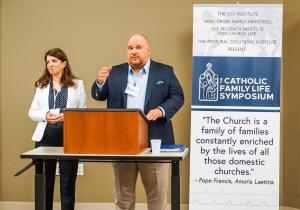In the Liturgy of Domestic Church Life, The Rite of Family Rituals asks families to create regular, daily times to work, play, talk, and pray together. Ri tuals like these enable families to practice the prophetic mission of their baptism by modeling Christian attitudes toward work, leisure, intimacy, and spirituality.
tuals like these enable families to practice the prophetic mission of their baptism by modeling Christian attitudes toward work, leisure, intimacy, and spirituality.
Crafting is one great way families can model a healthy approach to fun, and religious crafts can give kids a concrete way to connect with spiritual concepts. That said, to loosely paraphrase Jesus, it’s important to remember that crafts were made for man, not man for the crafts (see Mark 2:27—sort of).
In order to gain the spiritual benefits of any family ritual—including crafting–it needs to build relationships. Any activity that becomes about itself and not the people doing it, misses the point.
For instance, if you play Monopoly and winning the game becomes more important than building your relationships, you end up tearing each other to shreds. If you bake together, and decorating the cookies “just so” becomes the point of the experience, you’ll end up chasing the kids out of the kitchen to make sure it gets done “right.” And if you’re crafting for crafting’s sake, you have a family that looks great on Pinterest, but that’s about it. The last example is, I think, the modern take on Jesus’ “whitwashed tombs” (Matt 23:27).
We run into a lot folks who feel guilty that they aren’t crafty like “so-and-so.” In some circles, it can seem like being a holy family is synonymous with being a “crafty” family. How are our kids ever going to get to Heaven if we don’t make handmade nun’s habits for all their Barbie dolls—and in all the liturgical colors?!? “Now stop talking and hand me those ribbons for Heaven’s sake!”
If that’s your thing, and it truly draws your family together, that’s awesome. But if your family projects never quite work out as planned, or the very idea of working with construction paper makes you itch, that’s ok too. Failing to be a latter-day Martha Stewart doesn’t make your family less holy or your home less domestic-churchy than anyone else’s.
Living the Liturgy of Domestic Church Life isn’t about making beautiful props that turn your home into a miniature version of St Peter’s Basilica. It’s about spending time connecting, really connecting, with the people that God has given you to love and be loved by. It’s about being silly together, and cuddling together, and serving each other, and trying to be a physical sign of all the love God has in his heart for each of you. Whatever rituals help make that happen in your house are the “right” ones—even if they’re completely different from the rituals that the family in pew next to you (or that online family you admire) do in their domestic churches.
The Liturgy of Domestic Church Life isn’t about trying to get every family to do the same things or act the same way. It’s meant to be a template that helps families cover certain important bases in their own unique way. So, be mindful of the 3 Rites of the Liturgy of Domestic Church Life, but ask God (and your family) how you can use the model to bring out what’s best in your family.








